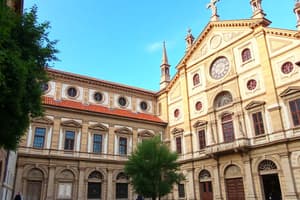Podcast
Questions and Answers
¿Qué es el humanismo en el Renacimiento?
¿Qué es el humanismo en el Renacimiento?
La creencia de que los seres humanos tienen el potencial para la grandeza y la creatividad.
¿Cómo se refleja el humanismo en la arquitectura renacentista?
¿Cómo se refleja el humanismo en la arquitectura renacentista?
Buscando crear estructuras que reflejen la belleza y complejidad de la experiencia humana.
¿Qué elementos clásicos eran frecuentemente incorporados por los arquitectos del Renacimiento en sus diseños?
¿Qué elementos clásicos eran frecuentemente incorporados por los arquitectos del Renacimiento en sus diseños?
Columnas, frontones y frisos.
¿Qué arquitectos son mencionados como destacados del Renacimiento?
¿Qué arquitectos son mencionados como destacados del Renacimiento?
¿Por qué los arquitectos renacentistas buscaban crear estructuras funcionales y estéticamente agradables?
¿Por qué los arquitectos renacentistas buscaban crear estructuras funcionales y estéticamente agradables?
¿Qué buscaban reflejar los arquitectos del Renacimiento en sus diseños?
¿Qué buscaban reflejar los arquitectos del Renacimiento en sus diseños?
¿Qué técnica se utilizó durante el Renacimiento para crear la ilusión de profundidad tridimensional en una imagen bidimensional?
¿Qué técnica se utilizó durante el Renacimiento para crear la ilusión de profundidad tridimensional en una imagen bidimensional?
¿Qué artista renacentista es conocido por su uso magistral de la técnica de chiaroscuro?
¿Qué artista renacentista es conocido por su uso magistral de la técnica de chiaroscuro?
¿Quién fue uno de los artistas más destacados del Renacimiento conocido por sus obras como La Creación de Adán en la Capilla Sixtina?
¿Quién fue uno de los artistas más destacados del Renacimiento conocido por sus obras como La Creación de Adán en la Capilla Sixtina?
¿Qué técnica renacentista implicaba el uso de fuertes contrastes entre luces y sombras para crear una sensación de profundidad en las obras de arte?
¿Qué técnica renacentista implicaba el uso de fuertes contrastes entre luces y sombras para crear una sensación de profundidad en las obras de arte?
¿Qué artistas renacentistas son conocidos como el trío principal de maestros del arte renacentista?
¿Qué artistas renacentistas son conocidos como el trío principal de maestros del arte renacentista?
¿Qué técnica de arte renacentista busca capturar la belleza y complejidad de la forma humana?
¿Qué técnica de arte renacentista busca capturar la belleza y complejidad de la forma humana?
Flashcards are hidden until you start studying
Study Notes
Renaissance Art and Architecture
The Renaissance was a period of immense cultural and artistic growth that spanned from the late 14th to the 17th centuries. This era marked a significant shift from the Middle Ages and saw the revival of classical Greek and Roman art and literature, leading to a profound impact on the evolution of art and architecture. In this article, we will explore the key aspects of Renaissance art and architecture.
Art
The Renaissance was a time of great innovation and experimentation in the world of art. Artists sought to capture the beauty and complexity of the human form, often employing techniques such as linear perspective and chiaroscuro to create a sense of depth and volume. Some of the most notable artists of the Renaissance include Leonardo da Vinci, Michelangelo, and Raphael.
Linear Perspective
Linear perspective is a technique used to create the illusion of three-dimensional depth in a two-dimensional image. This technique involves projecting parallel lines to a single vanishing point on the horizon line, creating a sense of depth and volume in the artwork.
Chiaroscuro
Chiaroscuro is the use of strong contrasts between light and dark to create a sense of depth and three-dimensionality in an artwork. This technique was popularized during the Renaissance and is often used to emphasize the volume of the subject and create a sense of drama and depth.
Humanism
The Renaissance was also marked by a new emphasis on humanism, or the belief that human beings have the potential for greatness and creativity. This is reflected in the art of the period, which often focuses on the human form and the human experience.
Architecture
The Renaissance was also a period of significant innovation in the field of architecture. Architects sought to create structures that were both functional and aesthetically pleasing, often incorporating classical elements and techniques into their designs. Some of the most notable architects of the Renaissance include Filippo Brunelleschi, Leon Battista Alberti, and Andrea Palladio.
Classical Elements
Renaissance architects often looked to the classical architecture of Greece and Rome for inspiration. They incorporated elements such as columns, pediments, and friezes into their designs, creating structures that were both functional and aesthetically pleasing.
Humanism in Architecture
Like the artists of the period, Renaissance architects also embraced the principles of humanism. They sought to create structures that reflected the beauty and complexity of the human experience, often incorporating elements such as intricate ornamentation and detailed sculpture into their designs.
Conclusion
The Renaissance was a period of immense cultural and artistic growth, marked by the revival of classical art and literature and a new emphasis on humanism. This period saw the development of new techniques in both art and architecture, leading to the creation of some of the most enduring and beautiful structures and works of art in history. From the masterful paintings of da Vinci and Raphael to the grand architectural designs of Brunelleschi and Alberti, the legacy of the Renaissance continues to inspire and captivate us today.
Studying That Suits You
Use AI to generate personalized quizzes and flashcards to suit your learning preferences.




